It looks like you're using an Ad Blocker.
Please white-list or disable AboveTopSecret.com in your ad-blocking tool.
Thank you.
Some features of ATS will be disabled while you continue to use an ad-blocker.
share:
originally posted by: SLAYER69
Has the thought ever occurred to anybody else that we 'The Earth' may have already been spotted in our 'goldielocks zone' by others a long time ago? I mean, if we with our meager 21st Century Tech can do it why couldn't other even more advanced Civilizations have spotted us in ours?
If they are out there and within 2,500-5,000 light years of our solar system then chances are they have.
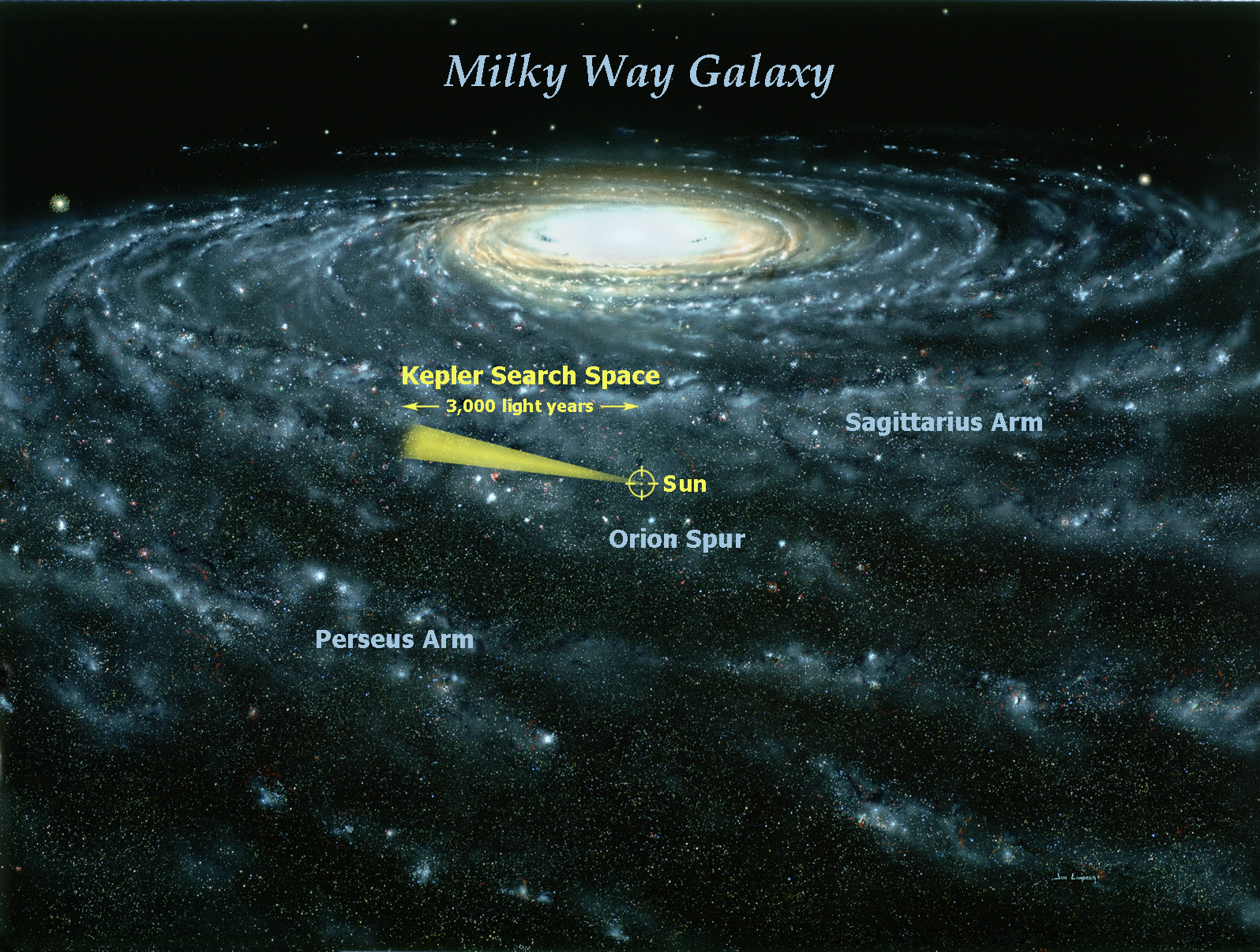
edit on 17-4-2014 by JadeStar because: (no reason given)
One of the things I like to do is bring discoveries like this home by tying them into Sci Fi representations of worlds.
Kepler 186f orbits a dim M-Dwarf star whose light is emitted mostly in the red and infrared.
As a result vegetation using photosynthesis on such a planet would be red-orange/yellow in color instead of green!
Listen to the scientist talk about that fact at about 49 minutes in here.
It would be a planet with what would look like a perpetual autumn, very similar this one "Niburu", from Star Trek: Into Darkness:
Also Kepler 186f is about 525 light years away.
This means light left the star it orbits, Kepler 186, 525 lightyears ago..
In context, Columbus had not done this yet, but was preparing to:

......as the year was 1489, in three years they'd set sail for "The New World".
Kepler 186f orbits a dim M-Dwarf star whose light is emitted mostly in the red and infrared.
As a result vegetation using photosynthesis on such a planet would be red-orange/yellow in color instead of green!
Listen to the scientist talk about that fact at about 49 minutes in here.
It would be a planet with what would look like a perpetual autumn, very similar this one "Niburu", from Star Trek: Into Darkness:
Also Kepler 186f is about 525 light years away.
This means light left the star it orbits, Kepler 186, 525 lightyears ago..
In context, Columbus had not done this yet, but was preparing to:

......as the year was 1489, in three years they'd set sail for "The New World".
edit on 17-4-2014 by JadeStar because: (no reason given)
I realized I posted a link to the abstract of the paper on this discovery earlier but the actual paper was behind a paywall.
You can access the previously embargoed paper for free at NASA's site here.
You can access the previously embargoed paper for free at NASA's site here.
edit on 17-4-2014 by JadeStar because: (no reason given)
originally posted by: WhiteWine
This is very exciting news Besides mass and size, we don't know what the atmosphere is made of and if it has water in it right?
Actually we don't know mass or density yet but they said it's highly likely this is a rocky world like our own based on its size.
As for water, it's one of the most common things in the universe and based on where this planet orbits its star, it could have fairly large oceans.
Being in the habitable zone of a star makes it very likely the planet is rocky with liquid water right?
s&f, thanks for sharing
That is correct.
I will be keeping a close eye on this one. There is some talk that they -may- be able to get the mass of the planet using the Hubble Space Telescope, but others say they are too far and too small to do this.
Once we know mass we'll know density and can start to answer a lot more questions.
Stay tuned!
edit on 17-4-2014 by JadeStar because: (no reason given)
a reply to: JadeStar
One day if we are able to travel to this planet with wormhole technology we would be standing on this planet and look back towards Earth 525 light years away.
If we create stronger telescopes to search for life in exo-atmospheres or signals from advanced civilizations...... we could find it on this planet potentially...... If we did, then imagine where that life or civilization would be 525 light years ahead of what we are viewing through our telescopes!?!
If we found out life exists on this planet as we look 525 light years into it's past, how do you think that life may evolve 525 light years later? (The time on their planet looking at Earth)
In other words, what do you think they could be doing now, observing us?
One day if we are able to travel to this planet with wormhole technology we would be standing on this planet and look back towards Earth 525 light years away.
If we create stronger telescopes to search for life in exo-atmospheres or signals from advanced civilizations...... we could find it on this planet potentially...... If we did, then imagine where that life or civilization would be 525 light years ahead of what we are viewing through our telescopes!?!
If we found out life exists on this planet as we look 525 light years into it's past, how do you think that life may evolve 525 light years later? (The time on their planet looking at Earth)
In other words, what do you think they could be doing now, observing us?
originally posted by: game over man
a reply to: JadeStar
One day if we are able to travel to this planet with wormhole technology we would be standing on this planet and look back towards Earth 525 light years away.
And the interesting thing is we'd be looking at the earth not as we left it but as it was 525 years ago.
Say there was some ultra secret 'stargate' type wormhole technology allowing near instantaneous travel anywhere in our Galaxy (going with the theme of this site ......
If you stepped through the wormhole and out onto the surface of Kepler 186f and had access to a huge array of space telescopes pointed at our Earth, you'd effectively be looking back in time to the Earth as it was in the year 1489!
That's why wormholes would be as much time machines as they would be shortcuts through space.
If we create stronger telescopes to search for life in exo-atmospheres or signals from advanced civilizations...... we could find it on this planet potentially...... If we did, then imagine where that life or civilization would be 525 light years ahead of what we are viewing through our telescopes!?!
Well it gets even better than that!
See, M-stars are the longest living stars in the Universe. They have lifetimes far exceeding that of our Sun.
The first M-dwarf stars to ever shine in our universe are still shining and will shine long after our Sun dies.
In fact, they're likely to be the last stars in the universe as their lifetimes are estimated to be in the hundreds of billions of years while our Universe may end in another 15 billion or so.
So.... with that in mind, this planet -may- be 10 billion years old, compared to our Earth's 4.5 billion years.
Any life there would not just be 525 years more advanced, but perhaps billions.
Or anywhere in between.
There's also a small chance this star and its planets are a billion years younger than the Sun.
They estimated it was anywhere from 3 to 10 billion years old.
If we found out life exists on this planet as we look 525 light years into it's past, how do you think that life may evolve 525 light years later? (The time on their planet looking at Earth)
Well like I said, it wouldn't just be a matter of 525 years but probably at the very least millions if not billions of years difference.
You see, stars are born at different times.
Our Sun and solar system were born very late into our Milky Way Galaxy's life. This is why we are often referred by astrobiologists as relative newcomers to the Universe.
Here is a good representation of what I'm talking about, presented by Neil DeGrasse Tyson on the reboot of Carl Sagan's Cosmos TV series:
OMG that clip is toooooooo short... So here, let Carl Sagan take over...
.....and THAT'S why most scholars believe any aliens we may encounter won't be just a little bit more advanced (ie: a couple hundred years) but a LOT more (ie: a couple million years, or more....)
In other words, what do you think they could be doing now, observing us?
Absolutely, and in great detail I might add!!!
Why do I say this?
Because let's just look at what we will be able to do not in 500 years, but in just the next 30 years.
Right now we can only take pictures of large planets around very young hot stars as shown in this video:
But with the use of a flower shaped starshade or other technology due to come online in the next 10 years we will be able to see any pale blue dots around the nearest stars.
So........
Within the next 30 we may build an even larger telescope which could show details of the surface like oceans, forests, continents etc.
BTW: This is no revolutionary idea. We know how to do this now, it's just a matter of money and resources.
The scientific community has been asking a similar question to what you asked but in reverse. What are we likely able to do in the near future.
In answer to that NASA laid out what the near future may look like in a report i've showed excerpts of below. It was an astrophysics roadmap produced last year called "Enduring Quests, Daring Visions - NASA Astrophysics in the Next Three Decades. You can download it here.
Everything from examining their atmospheres to examining them for possible use of technology through waste heat. Additionally there are researchers who have developed a technique to detect the unique character of artificial light (if any) on the night side a terrestrial exoplanet.
Some of this can be done from large Earth based telescopes, others from future space telescopes like the James Webb Telescope, W-FIRST-AFTA, and the JWST's future successor.
Once we start getting spectra (reflected light) back from planets like the one revealed today we'll be able to tell if they have life, perhaps even if they have technological life.
And like I said, this is not new breakthrough technology. We've had the technology to do some of this but unfortunately much of it is tied up in the intelligence community on National Reconnoissance Office spysats:
And once we can start getting spectra from exo-Earths back we might discover life by viewing detailed spectra of them:
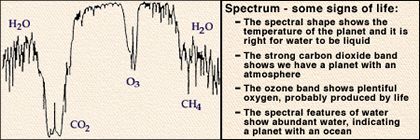
If we can stick around for the next 30 years this is on the horizon:
From NASA's own roadmap:
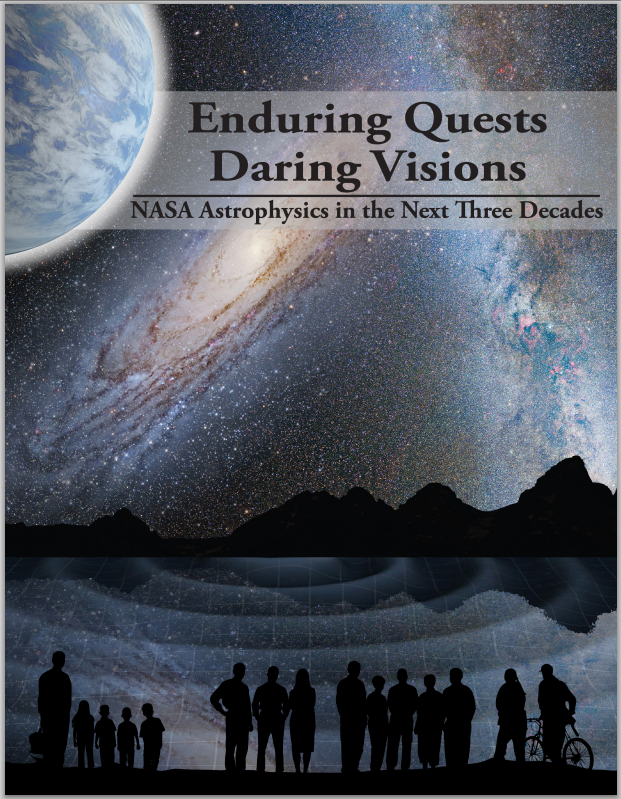
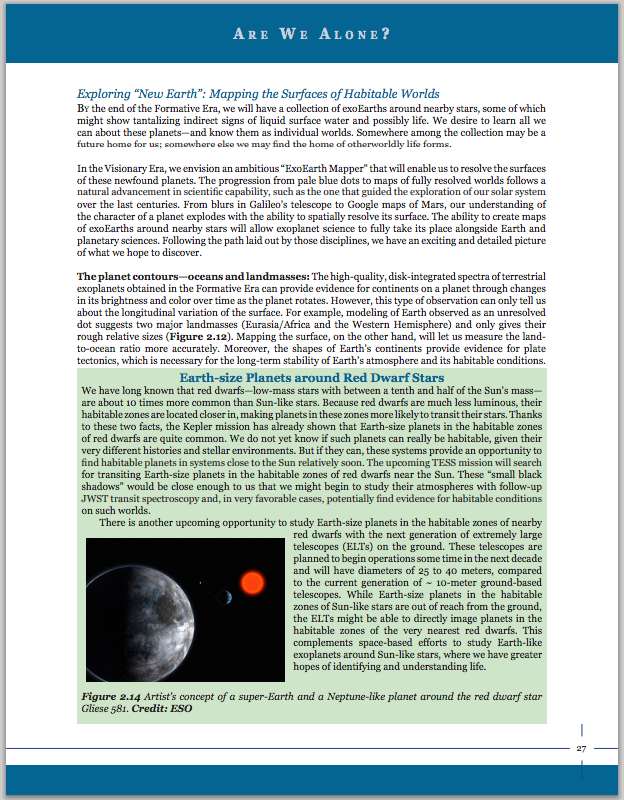
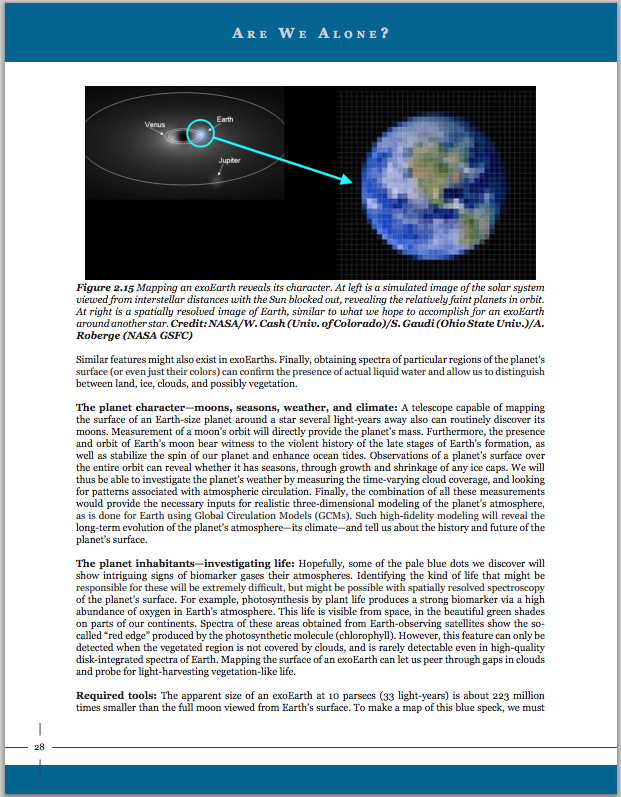
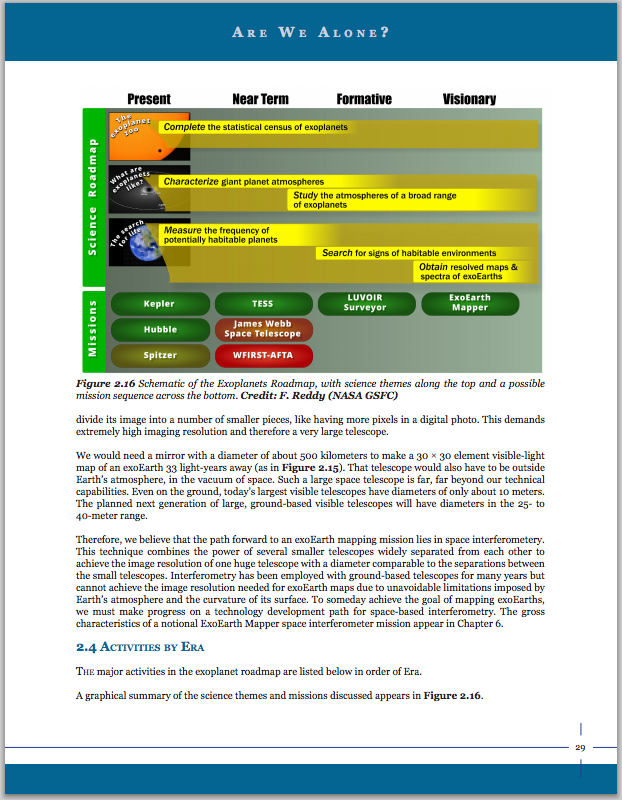
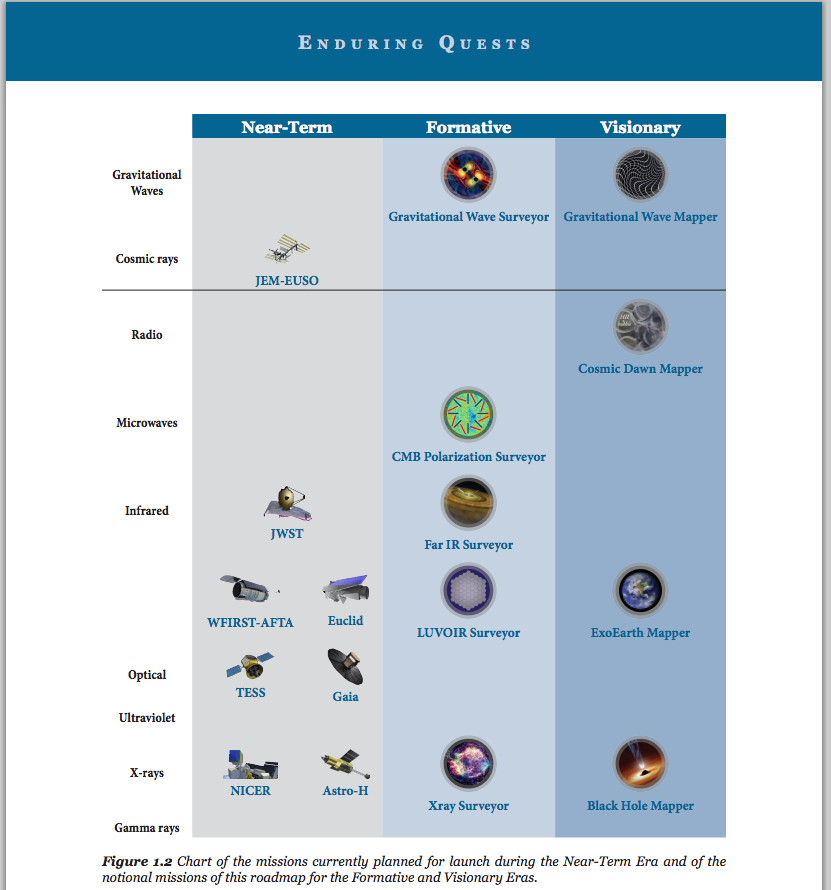
(Near Term = 10 years, Formative = 20 years, Visionary = 30 years)
Beyond Kepler and TESS there are plans for a telescope (called the LUVOIR Surveyor in the chart above) which would characterize the atmospheres of these worlds to tell us if there is life on them.
And Beyond that a telescope (called the ExoEarth Mapper in the chart above) which will actually take detailed pictures of them similar to this picture of Earth from the EPOXI mission is planned:
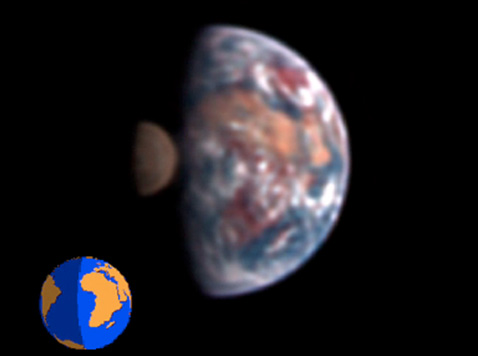
Giving us perhaps a slightly lower res version of a picture like this of a planet around a nearby star (perhaps even as close as Alpha Centauri or Barnard's Star).
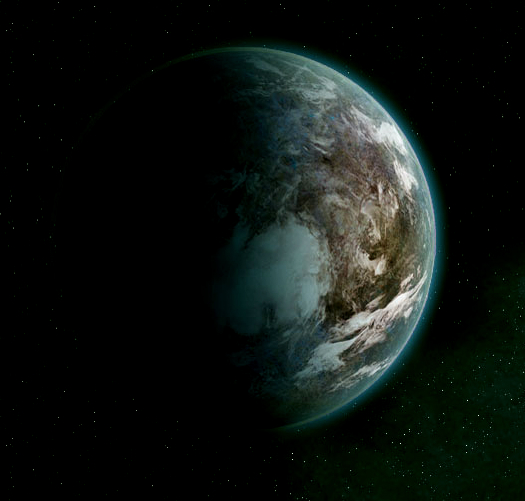
SO......in answer to your question, anything we can do, they likely can do much better and probably did long before anyone on Earth existed if such hypothetical aliens exist on one of these nearby worlds (and yes, 500 light years is fairly nearby - our Milky Way Galaxy is 100,000 light years across!)
There are no secrets about the Earth.
Anyone within 5,000 light years or so probably knows a lot about our planet and perhaps even about us.
If this whet your appetite here is a longer presentation of the WFIRST mission (one of two Hubble-sized space telescopes the NRO basically 'threw away" and gave NASA).
edit on 17-4-2014 by JadeStar because: (no reason given)
a reply to: SLAYER69
I've said this for a very long time. Right now at our current level of tech we are capable of finding thousands of planets and we could -if we had the will to do so- chart out many many more. So in theory any neighbors we have of semi equal tech levels would of spotted us. The question becomes what about neighbors who are hundreds or thousands of years ahead of us? I should imagine their children play with devices that allow them to see everything we do without having to leave the comfort of whatever they call a couch.
This does beg the question of "where are they?"...The longer we go without finding anyone, the more I'm begining to think there is something very fundamental that we are overlooking.
I've said this for a very long time. Right now at our current level of tech we are capable of finding thousands of planets and we could -if we had the will to do so- chart out many many more. So in theory any neighbors we have of semi equal tech levels would of spotted us. The question becomes what about neighbors who are hundreds or thousands of years ahead of us? I should imagine their children play with devices that allow them to see everything we do without having to leave the comfort of whatever they call a couch.
This does beg the question of "where are they?"...The longer we go without finding anyone, the more I'm begining to think there is something very fundamental that we are overlooking.
originally posted by: Helmkat
a reply to: SLAYER69
This does beg the question of "where are they?"...The longer we go without finding anyone, the more I'm begining to think there is something very fundamental that we are overlooking.
Which makes one wonder, how ants perceive us humans....
If a species were a million years more advanced than us (as they are likely to be based on what was presented above) then would we perceive them at all?
Arthur C. Clarke's 3rd Law:
"Any sufficiently advanced technology is indistinguishable from magic."
This is my first post here, I just love reading basically what others have wrote. Since it seems like we have the tech to find other earths, do we
have the tech to hide our earth from them? If a civ, even a few hundred more years advanced than ours showed up at our earth we would be in trouble
if they were hostile. So is their anyway possible to hide us from them while still exploring for other planets like ours? We have a lot of problems
here but we are very young in terms of the galactic scale of time, children always do make mistakes before they know better.
Can we hide from others looking for us or no? I know they can eventually hear our radio signals but would they be able to pin point us without triangulation? Can we hide from more advanced telescopes?
Can we hide from others looking for us or no? I know they can eventually hear our radio signals but would they be able to pin point us without triangulation? Can we hide from more advanced telescopes?
a reply to: Helmkat
If they're thousands of years ahead of us, why would they bother to contact us?
There's some native tribes in South America still pretty much untouched by our "modern civilization". Most feel it's better for them to be able to live their lives the way they always have, rather than introduce diseases and our technology. These people are happy and content, why screw it up?
I kinda think that's how advanced aliens see us. Or possibly they see us as an experiment in stupidity, and look at us as a very inferior people.
This discovery of Kepler186f is interesting, even to a non-astronomical mind such as mine.
BTW Welcome Dr. Greenthumb !
If they're thousands of years ahead of us, why would they bother to contact us?
There's some native tribes in South America still pretty much untouched by our "modern civilization". Most feel it's better for them to be able to live their lives the way they always have, rather than introduce diseases and our technology. These people are happy and content, why screw it up?
I kinda think that's how advanced aliens see us. Or possibly they see us as an experiment in stupidity, and look at us as a very inferior people.
This discovery of Kepler186f is interesting, even to a non-astronomical mind such as mine.
BTW Welcome Dr. Greenthumb !
edit on 17-4-2014 by AreUKiddingMe because: (no reason given)
edit on 17-4-2014 by
AreUKiddingMe because: accuracy
If someone on this planet is peering back at us, they wouldn't know that we're here, would they? There were no electrical emissions, or air pollution
500 years ago. When did mankind start generating the type of evidence of existence that would be detectable from afar?
It boggles my mind that this "close" planet would still be a 50 year journey traveling at Warp 10. Wow.
It boggles my mind that this "close" planet would still be a 50 year journey traveling at Warp 10. Wow.
edit on 4/17/2014 by carewemust
because: (no reason given)
originally posted by: DrGreenThumb
This is my first post here, I just love reading basically what others have wrote. Since it seems like we have the tech to find other earths, do we have the tech to hide our earth from them?
The answer is "not really" and "if we did you and I wouldn't be here long".
See the Earth has been transmitting a powerful signal, more powerful than all the radio transmitters on earth put together and it has been doing this for about 2.5 billion years.
Who did this you might wonder, how dare they right?!?! Who speaks for Earth?
Look out your -window-.
Unless you live in a desert or in the middle of a dense city, you might see one of the offenders.
A tree.
A plant.
All of them put together create oxygen and a unique signature that life exists here on Earth.
Life leaves a distinct fingerprint on the reflected light off our planet. It is the dip in the spectrum of our Earth due to lots of free oxygen in the Earth's atmosphere.
Without it, the Earth would look pretty boring at first glance. But then again, you and I couldn't breathe.
Oxygen is very reactive. It likes to "hook up" with any other molecules it encounters.
So oxygen doesn't last long in the atmosphere of a planet unless it is constantly being replaced by something.
That something is life. Specifically plant life.

Life is the only thing we know of in the universe which can constantly supply large amounts of oxygen to a planet's atmosphere.
We plan to find life on other planets around nearby stars by looking for large amounts of free oxygen in their atmospheres.
Any alien astronomers with powerful telescopes would have detected Earth's life signal any time within the last 2.5 billion years if they looked closely at the Earth.
If a civ, even a few hundred more years advanced than ours showed up at our earth we would be in trouble if they were hostile. So is their anyway possible to hide us from them while still exploring for other planets like ours?
Well, we could cut down all the trees, light off all the nukes and plunge the earth into a perpetual nuclear winter.
But the aliens would still see the Earth teaming with life for some time until the reflected light from the post-apocalyptic Earth reached them.
If they lived around Alpha Centaur (the nearest planetary system to our Solar System) then this would be a little over 4 years from now. Until then, Earth would still seem this lush place with free oxygen to them.
If they lived further away then it would take longer for the "lights out" signal reached them.
In the case of hypothetical aliens on Kepler 186f, they would see Earth as a lush place for the next 525 years if we nuked ourselves tomorrow.
We have a lot of problems here but we are very young in terms of the galactic scale of time, children always do make mistakes before they know better.
Can we hide from others looking for us or no?
I'd say the answer is no. The secret is out and has been out before human beings even existed. Anyone in our part of the Milky Way galaxy knows about the Earth if they are good astronomers.
But that's not too worrying to me because:
1) If they are advanced enough to get here they already have access to resources beyond our imagination and thus our planet would not be very interesting to them in terms of exploitation.
and
2) There are likely around 50 billion planets like Earth in our galaxy. With so many planets to choose from an advanced species would probably be wise enough to avoid inhabited ones because uninhabited Earthlike planets likely outnumber the inhabited ones.
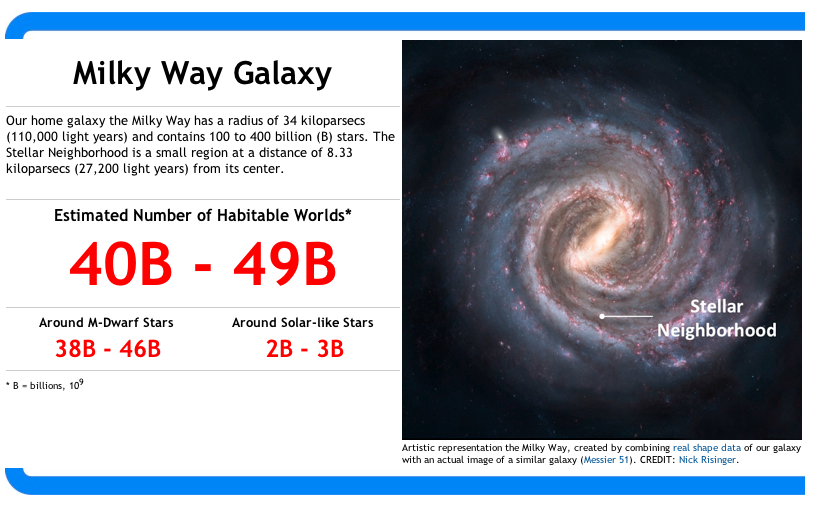
3) Intelligent life might be the rarest thing in the universe. As such we'd likely be studied by them, not destroyed.
I know they can eventually hear our radio signals but would they be able to pin point us without triangulation? Can we hide from more advanced telescopes?
We can not hide in any way that the Earth would remain viable to life and as I said, we probably don't need to. Anyone in the neighborhood of our part of the galaxy already knows we're here and probably knew that for a LONG time.
edit on 17-4-2014 by JadeStar because: (no reason
given)
originally posted by: carewemust
If someone on this planet is peering back at us, they wouldn't know that we're here, would they? There were no electrical emissions, or air pollution 500 years ago.
They would not know technological life is here yet. And wouldn't know that for another 300 years at least.
BUT they would know that LIFE existed on Earth because of all the plants, trees, moss, algae, etc which produces oxygen in our atmosphere. The Earth has been transmitting to all nearby that photosynthetic life (plants) existed here for around 2.5 billion years.
[quote[When did mankind start generating the type of evidence of existence that would be detectable from afar?
The late 1800s for artificial lighting (which may be detectable at interstellar distances) and the 1930s for radio powerful enough to be detected in theory at interstellar distances.
I made this video to illustrate this:
It boggles my mind that this "close" planet would still be a 50 year journey traveling at Warp 10. Wow.
Space is big and distances between the stars huge. That's why it is unlikely interstellar travel, even for a super advanced civilization would ever be anything as trivial as it is sometimes portrayed in sci-fi.
Even with warp drives.
edit on 17-4-2014 by JadeStar because: (no reason given)
a reply to: JadeStar
This is all well and good, but what good does it do us if it's 500 light years away? We'll be dead before anyone could reach it, should we need a new planet to inhabit.
How much money was spent on this discovery while we have people starving in our streets?
This is all well and good, but what good does it do us if it's 500 light years away? We'll be dead before anyone could reach it, should we need a new planet to inhabit.
How much money was spent on this discovery while we have people starving in our streets?
a reply to: JadeStar
That's a "humbling" video you put together JadeStar. If we happen to see another planet one day that is inhabited by life, and is about 100 light-years distant, how would we reach out to them? Our generation could send a message, but it wouldn't be received until we're dead. Assuming that the target population replies back in the same manner, our great grandchildren would be senior citizens when the response is received.
I think mankind needs a revolutionary way to explore the universe...something that's far beyond light speed. Perhaps the spiritual/astral realm will be the frontier where we hit pay dirt. I'm sure many ATS members would be thrilled to see man step on Mars one day...but the real reward will be when we make contact with another intelligent species. That would be SO EXCITING!
That's a "humbling" video you put together JadeStar. If we happen to see another planet one day that is inhabited by life, and is about 100 light-years distant, how would we reach out to them? Our generation could send a message, but it wouldn't be received until we're dead. Assuming that the target population replies back in the same manner, our great grandchildren would be senior citizens when the response is received.
I think mankind needs a revolutionary way to explore the universe...something that's far beyond light speed. Perhaps the spiritual/astral realm will be the frontier where we hit pay dirt. I'm sure many ATS members would be thrilled to see man step on Mars one day...but the real reward will be when we make contact with another intelligent species. That would be SO EXCITING!
originally posted by: sled735
a reply to: JadeStar
This is all well and good, but what good does it do us if it's 500 light years away? We'll be dead before anyone could reach it, should we need a new planet to inhabit.
First off, if you're looking for a planet to inhabit it is likely to be a LONG time before we could go to even the nearest star systems in a human lifetime.
The distances are vast. Its not like crossing an ocean in terms of technical challenge. Its far greater than that.
So.. the reason to learn about this world is because it is orbiting the most common type of star in the universe. And there are PLENTY of these types of stars nearby to the Earth, within 40 light years.
So while we may never be able to journey to this planet in any reasonable period of time we may be able in some distant future, travel to similar ones nearby.
But honestly, the reason we do science is not for exploitation but pure knowledge mostly.
It will be very exciting if a nearby planet like this is found because we will be able to further study it for signs of life, technology, etc.
Learning how frequent life in the universe is, would be a huge thing.
How much money was spent on this discovery while we have people starving in our streets?
How much money was spent on the Superbowl or will be spent on this summer's World Cup in Brazil?
Or how much money did you spend on clothing which you could have donated to the nearest homeless shelter?
That question is about as relevant as yours.
Money spent on science at least enriches our species and moves us forward as a planet and its not like this money came out of a budget allocated to feeding the homeless. You're really barking up the wrong tree with that. Go bug the military.
edit on 18-4-2014 by JadeStar because: (no
reason given)
a reply to: JadeStar
one of the good things about this discovery (if it's true and accepted by many) is some people will stop taking life so seriously on this planet, especially when it comes to beliefs and possessions.
it's just impossible for us to be alone in this universe (even if earth is the centre of universe)
peace.
one of the good things about this discovery (if it's true and accepted by many) is some people will stop taking life so seriously on this planet, especially when it comes to beliefs and possessions.
it's just impossible for us to be alone in this universe (even if earth is the centre of universe)
peace.
edit on 18-4-2014 by dodol because: (no reason given)
edit on 18-4-2014 by dodol because: (no reason given)
originally posted by: carewemust
a reply to: JadeStar
That's a "humbling" video you put together JadeStar. If we happen to see another planet one day that is inhabited by life, and is about 100 light-years distant, how would we reach out to them?
An interesting question, and one I posed in a hypothetical news story about a discovery similar to this one which I posted on ATS a few months ago: Astronomers Detect First 'Clear Signs of Civilization' Beyond Earth - How will you react?
Our generation could send a message, but it wouldn't be received until we're dead.
So? Most of the great works of art and scientific discoveries as well as religious texts were created before you were born.
Were they not meaningful simply because their creators are dead?
I am not entirely sure we'd send an intentional message. We'd all have to agree as a planet on what to send about ourselves. Getting 160 nations to agree on far simpler, earthly matters is hard enough. It would probably take generations just to get an agreement to send any sort of message.
Assuming that the target population replies back in the same manner, our great grandchildren would be senior citizens when the response is received.
I think mankind needs a revolutionary way to explore the universe...something that's far beyond light speed.
I agree, but the laws of physics are pretty clear. One can't simply wish them away.
Perhaps the spiritual/astral realm will be the frontier where we hit pay dirt.
Unless the 'spiritual/astral' realm can produce repeatable observations that can be physically verified then it's useless as a means of exploration.
There are people looking into things like warping space/time, traversable wormholes, etc but it will be some time before we'd have enough of energy to do anything of that sort if they're viable.
The most important thing is people are trying. It may be that we never travel faster than the speed of light. Thats fine. In theory humanity still could spread throughout the galaxy at slower than light speeds in something like 100 million years (which seems a long time until you realize our Earth has been around for 4.5 billion years or 4500 million years).
edit on 18-4-2014 by JadeStar because: (no reason given)
originally posted by: JadeStar
originally posted by: carewemust
a reply to: JadeStar
That's a "humbling" video you put together JadeStar. If we happen to see another planet one day that is inhabited by life, and is about 100 light-years distant, how would we reach out to them?
An interesting question, and one I posed in a hypothetical news story about a discovery similar to this one which I posted on ATS a few months ago: Astronomers Detect First 'Clear Signs of Civilization' Beyond Earth - How will you react?
Could we communicate by laser or by bending space-time? Previosly I was thinking quantum entanglement, but nevermind.
Our generation could send a message, but it wouldn't be received until we're dead.
So? Most of the great works of art and scientific discoveries as well as religious texts were created before you were born.
Were they not meaningful simply because their creators are dead?
I am not entirely sure we'd send an intentional message. We'd all have to agree as a planet on what to send about ourselves. Getting 160 nations to agree on far simpler, earthly matters is hard enough. It would probably take generations just to get an agreement to send any sort of message.
Assuming that the target population replies back in the same manner, our great grandchildren would be senior citizens when the response is received.
I think mankind needs a revolutionary way to explore the universe...something that's far beyond light speed.
I agree, but the laws of physics are pretty clear. One can't simply wish them away.
Perhaps the spiritual/astral realm will be the frontier where we hit pay dirt.
Unless the 'spiritual/astral' realm can produce repeatable observations that can be physically verified then it's useless as a means of exploration.
There are people looking into things like warping space/time, traversable wormholes, etc but it will be some time before we'd have enough of energy to do anything of that sort if they're viable.
The most important thing is people are trying. It may be that we never travel faster than the speed of light. Thats fine. In theory humanity still could spread throughout the galaxy at slower than light speeds in something like 100 million years (which seems a long time until you realize our Earth has been around for 4.5 billion years or 4500 million years).
new topics
-
UK and Europe Floods
Rant: 1 hours ago -
FEMA kicks hurricane survivors out of temporary housing into snowstorm and freezing temperatures
Disaster Conspiracies: 1 hours ago -
Failures of leadership on display
US Political Madness: 1 hours ago -
Power grid faults surged right before Los Angeles wildfires began
Mainstream News: 1 hours ago -
Tustin California Military equipment stolen BIG equipment .
Social Issues and Civil Unrest: 1 hours ago -
PALES-TINE, PALES-ADES and the Australian Aboriginal "Lightning Man"
Dreams & Predictions: 2 hours ago
top topics
-
Tustin California Military equipment stolen BIG equipment .
Social Issues and Civil Unrest: 1 hours ago, 10 flags -
Failures of leadership on display
US Political Madness: 1 hours ago, 8 flags -
FEMA kicks hurricane survivors out of temporary housing into snowstorm and freezing temperatures
Disaster Conspiracies: 1 hours ago, 8 flags -
How To Spot Fake U.F.O. Photos
Aliens and UFOs: 13 hours ago, 7 flags -
Scary video of face in an abandoned house
Paranormal Studies: 16 hours ago, 6 flags -
Power grid faults surged right before Los Angeles wildfires began
Mainstream News: 1 hours ago, 6 flags -
PALES-TINE, PALES-ADES and the Australian Aboriginal "Lightning Man"
Dreams & Predictions: 2 hours ago, 5 flags -
UK and Europe Floods
Rant: 1 hours ago, 3 flags
active topics
-
Los Angeles brush fires latest: 2 blazes threaten structures, prompt evacuations
Mainstream News • 404 • : Oldcarpy2 -
This should be plastered all over the airwaves
Mainstream News • 58 • : fringeofthefringe -
FEMA kicks hurricane survivors out of temporary housing into snowstorm and freezing temperatures
Disaster Conspiracies • 6 • : Astrocometus -
Failures of leadership on display
US Political Madness • 5 • : tkwaz -
Fire insurance in LA withdrawn months ago
General Conspiracies • 40 • : xuenchen -
Instrumental Surf Music - Origins to the Present Day
Music • 251 • : underpass61 -
Power grid faults surged right before Los Angeles wildfires began
Mainstream News • 3 • : fringeofthefringe -
Mood Music Part VI
Music • 3783 • : underpass61 -
Post A Funny (T&C Friendly) Pic Part IV: The LOL awakens!
General Chit Chat • 8016 • : underpass61 -
Could the Civil War have been about piracy?
History • 8 • : Solvedit
